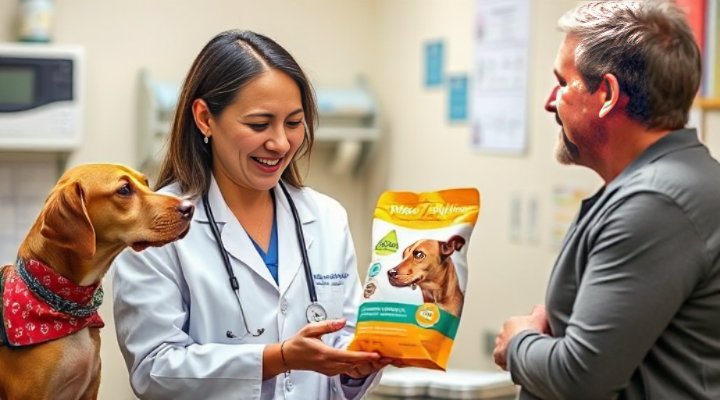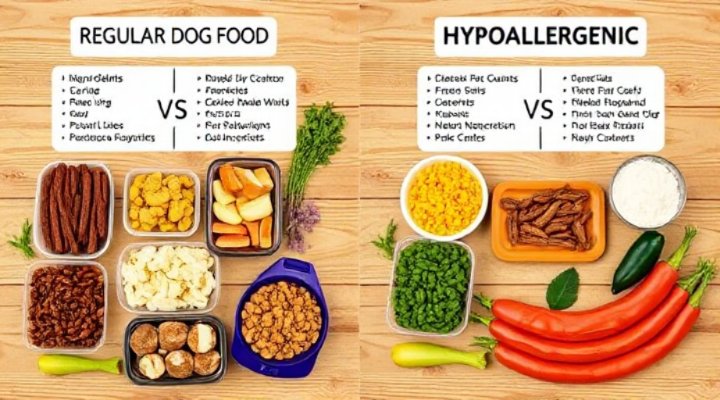Summary: Dealing with dog food allergies can be challenging for any pet owner, but finding the right dog food for allergies solutions doesn’t have to be overwhelming. This comprehensive guide provides everything you need to manage and prevent allergic reactions through specialized canine diets, offering practical advice and expert recommendations to ensure your furry friend lives comfortably and healthily.

Understanding Dog Food Allergies and Common Triggers
Firstly, it’s crucial to understand what exactly constitutes a food allergy in dogs. Contrary to popular belief, food allergies are different from food intolerances. Food allergies involve an immune system response, while intolerances are digestive issues. According to the FDA’s pet food safety guidelines, common allergens include beef, dairy, wheat, egg, chicken, lamb, soy, pork, rabbit, and fish. Interestingly, most dogs are allergic to more than one thing simultaneously.
That is to say, when your dog’s immune system mistakenly identifies a particular food protein as a threat, it launches an attack, resulting in allergic symptoms. Consequently, this immune response can cause various issues ranging from skin problems to gastrointestinal distress. For instance, my own Labrador, Bailey, developed allergies at age three, and it took us several months of trial and error to identify chicken as the primary culprit.
Identifying Symptoms of Food Allergies in Dogs
Recognizing the signs of food allergies is the first step toward finding effective dog food for allergies solutions. Common symptoms include itchy skin (especially around ears, paws, and rear end), chronic ear infections, hair loss, hot spots, vomiting, diarrhea, and excessive gas. Above all, persistent itching is often the most telling sign that your dog might be suffering from food allergies.
Meanwhile, it’s important to note that these symptoms can also indicate other health issues. Therefore, proper diagnosis by a veterinarian is essential before implementing any dietary changes. Similarly, allergy symptoms can develop at any age, even if your dog has been eating the same food for years without issues previously.

Effective Diagnostic Methods for Canine Food Allergies
When it comes to diagnosing food allergies, the gold standard remains the elimination diet trial. This process involves feeding your dog a novel protein source or hydrolyzed protein diet for 8-12 weeks exclusively. During this period, you must avoid all treats, table scraps, and flavored medications that could interfere with results.
Furthermore, many pet owners find success with hydrolyzed protein dog food, where proteins are broken down into smaller molecules that are less likely to trigger allergic responses. Additionally, some veterinarians may recommend blood or skin tests, though these are generally considered less reliable than elimination diets for food allergy diagnosis.
Implementing an Elimination Diet Successfully
To implement an elimination diet effectively, choose a protein source your dog has never eaten before, such as venison, duck, or kangaroo. Subsequently, feed this exclusively for the trial period while meticulously monitoring symptoms. Most importantly, keep a detailed food diary noting any changes in your dog’s condition, as this will help identify patterns and triggers.
But however tempting it might be, avoid giving any other foods during this period. Even small treats can sabotage the process and prolong your dog’s discomfort. Likewise, ensure all family members understand the importance of strict adherence to the elimination diet for accurate results.
Best Hypoallergenic Dog Food Options and Recommendations
Once you’ve identified your dog’s allergens, the next step is selecting appropriate dog food for allergies solutions. Hypoallergenic dog foods typically feature limited ingredients, novel proteins, or hydrolyzed proteins. These specialized diets are formulated to minimize allergic reactions while providing complete nutrition.
For example, many veterinary-recommended brands offer excellent organic dog food options for sensitive stomachs that also work well for allergy management. Moreover, some premium commercial brands provide limited ingredient diets containing single protein sources and easily digestible carbohydrates like sweet potatoes or peas.
Top Recommended Hypoallergenic Dog Food Brands
Among the most recommended options for dog food for allergies solutions are Royal Canin Veterinary Diet Hydrolyzed Protein, Purina Pro Plan Veterinary Diets HA, Hill’s Prescription Diet z/d, and Blue Natural Veterinary Diet NP. These therapeutic foods are specifically designed for dogs with food sensitivities and are available through veterinarians.
Additionally, several over-the-counter options have proven effective for mild to moderate allergies, including Natural Balance L.I.D., Canidae Pure, and Wellness Simple Limited Ingredient Diet. Consequently, discussing these options with your veterinarian can help determine the best choice for your dog’s specific needs and budget.

Natural and Homemade Solutions for Dog Food Allergies
Beyond commercial options, many pet owners explore natural and homemade dog food for allergies solutions. Preparing homemade meals allows complete control over ingredients, making it easier to avoid allergens. However, it’s crucial to ensure these diets are nutritionally balanced, which often requires consultation with a veterinary nutritionist.
Meanwhile, incorporating supplements like omega-3 fatty acids, probiotics, and digestive enzymes can support skin health and improve gut function in allergic dogs. According to research from National Center for Biotechnology Information, omega-3 fatty acids particularly show promise in reducing inflammatory responses associated with allergies.
Creating Balanced Homemade Diets for Allergic Dogs
When preparing homemade meals, include a novel protein source, complex carbohydrates, healthy fats, and essential vitamins and minerals. For instance, a balanced meal might consist of lean duck meat, quinoa, sweet potatoes, flaxseed oil, and a canine-specific vitamin supplement. Subsequently, gradually introduce this new diet while monitoring your dog’s response.
Furthermore, consider incorporating healthy homemade treat recipes adapted for dogs to maintain consistency in allergen avoidance. Most importantly, work with your veterinarian to ensure the homemade diet meets all your dog’s nutritional requirements, as deficiencies can exacerbate health issues.
Long-Term Management and Prevention Strategies
Successfully managing dog food allergies requires ongoing vigilance and adaptation. Once you’ve identified safe foods, stick to them consistently while remaining alert for any changes in your dog’s condition. Additionally, regularly review ingredient lists, as manufacturers sometimes change formulations without prominent notice.
Moreover, maintain open communication with your veterinarian regarding your dog’s progress and any concerns that arise. Meanwhile, consider periodic reassessments, as dogs can develop new allergies over time. Likewise, environmental factors can influence allergic responses, so comprehensive management may involve addressing multiple aspects of your dog’s lifestyle.
Preventing Allergy Flare-Ups and Maintaining Health
To prevent flare-ups, avoid introducing new foods or treats without proper testing. Instead, when considering dietary changes, introduce one new ingredient at a time and monitor for reactions over several days. Consequently, this cautious approach helps identify potential triggers before they cause significant issues.
Furthermore, support your dog’s overall health through regular exercise, proper grooming, and stress reduction, as these factors can influence immune function and allergic responses. Additionally, consider choosing appropriate dog bowls that are easy to clean and don’t harbor bacteria that could complicate skin issues.

When to Seek Professional Help for Severe Allergies
While many food allergies can be managed with dietary changes alone, some cases require professional intervention. If your dog experiences severe reactions, doesn’t respond to elimination diets, or has multiple health issues, consult a veterinary dermatologist or internal medicine specialist. These experts can provide advanced testing and treatment options beyond standard approaches.
Additionally, if your dog’s quality of life remains compromised despite dietary changes, explore other potential causes with your veterinarian. Sometimes, what appears to be food allergies might actually be environmental allergies or other medical conditions requiring different treatment approaches.
Integrating Behavioral Support with Dietary Management
Interestingly, food allergies can sometimes manifest as behavioral changes due to discomfort. Dogs experiencing chronic itching or digestive issues may become irritable, anxious, or develop other behavioral problems. Therefore, comprehensive dog food for allergies solutions might include behavioral training support alongside dietary management.
Moreover, consider consulting a professional dog behaviorist if allergy-related discomfort affects your dog’s temperament or training progress. By addressing both physical and behavioral aspects, you provide holistic care that significantly improves your dog’s quality of life.
In conclusion, managing dog food allergies requires patience, diligence, and often professional guidance. Through proper identification of triggers, implementation of appropriate dog food for allergies solutions, and ongoing monitoring, most dogs with food allergies can enjoy comfortable, happy lives. Remember that every dog is unique, so what works for one may not work for another—stay committed to finding the right approach for your canine companion.
Related Keywords: hypoallergenic dog food, limited ingredient diet, novel protein dog food, hydrolyzed protein diet, dog allergy treatment, canine nutrition, food elimination trial, allergic dermatitis in dogs, grain-free dog food, veterinary prescription diet

